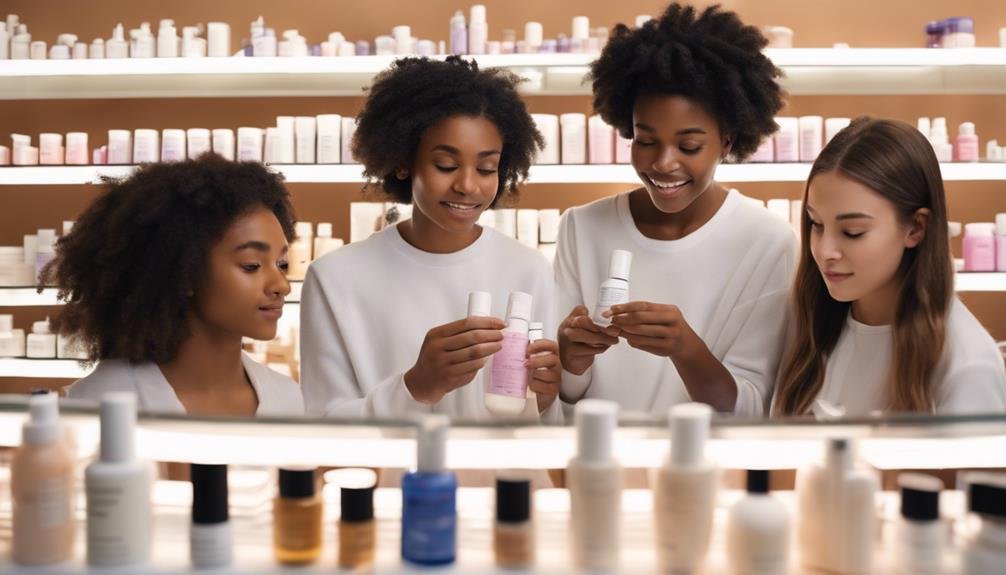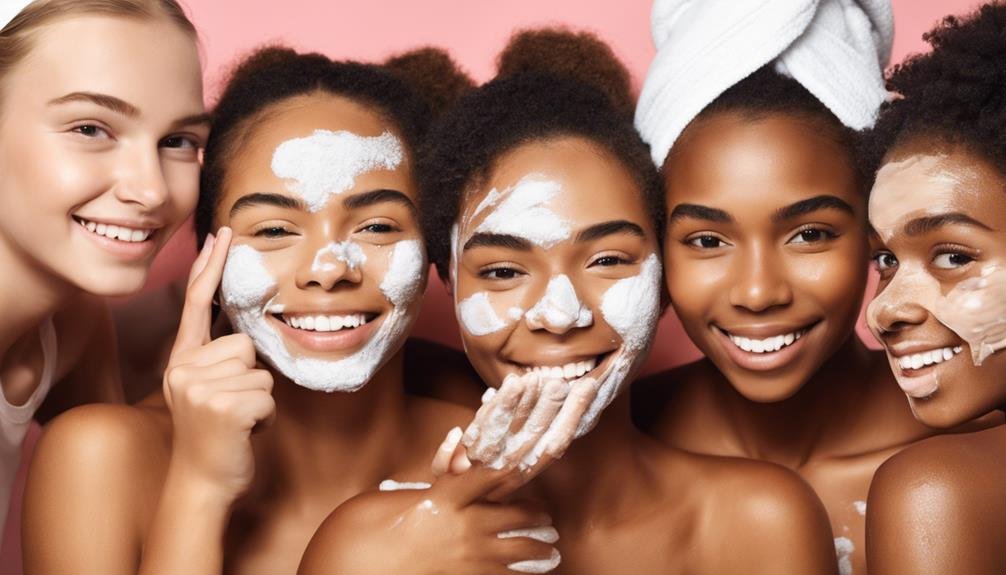Imagine your skin as a delicate canvas that needs care and attention to stay vibrant and youthful. From cleansing to protection, each step plays a vital role in nurturing your skin. By implementing these essential skin care tips, you can pave the way for a healthier complexion. Remember, your skin is a reflection of your overall well-being, so taking care of it now will benefit you in the long run.
Key Takeaways
- Establish a daily cleansing routine with a gentle cleanser to manage hormonal skin issues.
- Stay hydrated for skin elasticity; drink water, use moisturizer, and limit caffeine intake.
- Choose skincare products based on skin type, ingredients, and avoid harmful substances.
- Protect skin from sun damage with SPF sunscreen, protective clothing, and shade.
- Maintain a healthy diet with antioxidants, Omega-3 fatty acids, vitamins, and probiotics for clear skin.
Daily Cleansing Routine
Establishing a consistent daily cleansing routine is crucial for maintaining healthy skin during your teenage years. As you navigate through this transformative period of your life, your skin undergoes various changes due to hormonal fluctuations and increased oil production. These changes can lead to issues like acne, blackheads, and excess oiliness if not managed properly. By incorporating a daily cleansing routine into your skincare regimen, you can effectively remove dirt, excess oil, and impurities that accumulate on your skin throughout the day.
When selecting a cleanser, opt for a gentle, non-comedogenic formula that suits your skin type. Whether you have oily, dry, combination, or sensitive skin, choosing the right cleanser is essential to prevent irritation or exacerbation of existing skin concerns.
Remember to wash your face twice a day, in the morning and before bed, to keep your skin clean and fresh. Avoid harsh scrubbing or using hot water, as these can strip your skin of its natural oils and disrupt its delicate balance. By committing to a daily cleansing routine, you can help your skin stay clear, balanced, and healthy during your teenage years.
Importance of Hydration
Maintaining adequate hydration is a key component of a comprehensive skincare routine, especially during your teenage years. Hydration plays a crucial role in keeping your skin healthy, vibrant, and youthful. Dehydration can lead to dullness, dryness, and even exacerbate skin conditions like acne. Here's a quick look at the importance of hydration:
| Benefits of Hydration | Effects of Dehydration | Tips for Staying Hydrated |
|---|---|---|
| Helps maintain skin elasticity | Can lead to dry, flaky skin | Drink plenty of water daily |
| Aids in the natural detoxification process | Increases risk of premature aging | Eat water-rich fruits and vegetables |
| Improves overall skin texture | Skin becomes more prone to irritation | Use a hydrating moisturizer daily |
| Reduces the appearance of wrinkles | Decreases skin's ability to heal | Limit caffeine and sugary drinks |
| Enhances skin's natural glow | May result in a dull complexion | Invest in a good quality humidifier |
Choosing the Right Products
To achieve optimal skin health, it's essential to select the right products tailored to your specific needs and concerns. When choosing skincare products as a teen, keep these tips in mind:
- Understand Your Skin Type: Determine if you have oily, dry, combination, or sensitive skin to choose products that work best for you.
- Check for Key Ingredients: Look for ingredients like salicylic acid for acne-prone skin or hyaluronic acid for hydration.
- Avoid Harmful Ingredients: Stay away from products containing sulfates, parabens, and synthetic fragrances that can irritate the skin.
- Consider Non-Comedogenic Products: Opt for non-comedogenic products to prevent clogged pores and breakouts.
- Consult a Professional: If you're unsure about what products to use, seek advice from a dermatologist or skincare specialist for personalized recommendations.
Sun Protection Essentials
Ensuring adequate sun protection is vital for maintaining healthy skin and preventing long-term damage from harmful UV rays. As a teen, it's crucial to protect your skin from the sun's harmful effects to prevent premature aging, sunburns, and even skin cancer. Make sunscreen a daily essential by choosing a broad-spectrum formula with at least SPF 30. Apply it generously and reapply every two hours, especially when outdoors or swimming.
Aside from sunscreen, incorporating sun-protective clothing like hats, sunglasses, and long sleeves can provide additional defense against UV rays. Seek shade during peak sun hours, typically between 10 a.m. and 4 p.m., when the sun's rays are strongest.
Remember that sun exposure can still occur on cloudy days, so sunscreen is a must year-round.
Healthy Diet for Clear Skin
A balanced and nutrient-rich diet plays a significant role in promoting clear and healthy skin. What you eat can directly impact the quality of your skin. Here are some key elements to include in your diet for glowing skin:
- Hydration: Drink plenty of water to keep your skin hydrated and maintain its elasticity.
- Antioxidants: Include fruits like berries, vegetables like spinach, and nuts to fight free radicals and reduce inflammation.
- Omega-3 Fatty Acids: Consume sources like salmon, chia seeds, and walnuts to help maintain skin's natural oil barrier.
- Vitamins: Ensure you get enough Vitamin A from foods like sweet potatoes, Vitamin C from citrus fruits, and Vitamin E from almonds for skin repair and protection.
- Probiotics: Incorporate yogurt, kefir, or fermented foods to support gut health, which is linked to skin health.
Managing Acne Breakouts
Maintaining a healthy diet is a foundational step towards achieving clear skin, but for many teens, acne breakouts can still be a common concern. Acne occurs when hair follicles become clogged with oil and dead skin cells, leading to the formation of pimples, blackheads, or whiteheads. To manage acne breakouts effectively, it's crucial to establish a consistent skincare routine.
Start by washing your face twice daily with a gentle cleanser to remove excess oil and impurities. Consider using non-comedogenic products to prevent pore blockages.
In addition to a proper skincare regimen, avoiding excessive touching or picking at your face can help prevent further irritation and spread of bacteria. If you wear makeup, opt for oil-free and non-comedogenic formulas. Regularly changing your pillowcases and sheets can also minimize contact with bacteria that may exacerbate acne.
Remember to be patient with your skin as results may take time. If acne persists or worsens, consult a dermatologist for personalized treatment options. By taking proactive steps and caring for your skin consistently, you can effectively manage acne breakouts and promote clearer, healthier skin.
Gentle Exfoliation Techniques
When it comes to maintaining healthy and radiant skin, incorporating gentle exfoliation techniques into your skincare routine can be highly beneficial. Exfoliation helps remove dead skin cells, unclogs pores, and promotes cell turnover, leading to smoother, brighter skin.
Here are some gentle exfoliation techniques to consider:
- Use a mild exfoliating scrub: Look for products with gentle exfoliants like sugar or jojoba beads to avoid irritation.
- Consider chemical exfoliants: Ingredients like glycolic acid or salicylic acid can help dissolve dead skin cells without harsh scrubbing.
- Try a soft washcloth: Wet a soft washcloth with warm water and gently massage your face in circular motions to slough off dead skin.
- Use a cleansing brush: Electric cleansing brushes can provide gentle exfoliation and help cleanse the skin more effectively.
- Be gentle: Avoid scrubbing too hard, as this can cause micro-tears in the skin. Instead, use light pressure and exfoliate 1-2 times a week for best results.
Stress Management Tips
To effectively manage stress, it's important to recognize its impact on your skin health. Stress can trigger breakouts, worsen skin conditions like eczema or psoriasis, and accelerate the aging process. Implementing stress management techniques can help maintain healthy skin.
One effective strategy is practicing mindfulness through activities like meditation or deep breathing exercises. These practices can help calm your mind and reduce stress levels, promoting clearer skin.
Regular physical activity is another vital component of stress management. Exercise releases endorphins, which are natural mood lifters that can combat stress. Additionally, staying active can improve blood circulation, delivering essential nutrients to the skin and promoting a healthy glow.
Maintaining a balanced lifestyle that includes proper nutrition, hydration, and sufficient sleep is crucial in managing stress and keeping your skin radiant. Don't underestimate the power of self-care activities like journaling, spending time with loved ones, or engaging in hobbies you enjoy. Prioritizing stress management won't only benefit your skin but also your overall well-being.
Getting Enough Sleep
Adequate sleep plays a crucial role in maintaining healthy skin and overall well-being. Ensuring you get enough rest each night is essential for your skin's health. Here are some tips to help you prioritize sleep for better skin:
- Establish a Routine: Aim to go to bed and wake up at the same time every day, even on weekends.
- Create a Relaxing Environment: Make your bedroom conducive to sleep by keeping it dark, quiet, and cool.
- Limit Screen Time: Avoid screens like phones or laptops at least an hour before bedtime to improve sleep quality.
- Stay Active: Regular exercise can help you fall asleep faster and enjoy deeper sleep.
- Watch Your Diet: Avoid heavy meals close to bedtime and limit caffeine intake in the afternoon to promote better sleep.
Avoiding Harsh Ingredients
Maintaining healthy skin involves more than just external care; it also requires being mindful of the products you use. When choosing skincare products, avoid harsh ingredients that can cause irritation and damage to your skin. Ingredients like alcohol, fragrances, and certain preservatives can strip your skin of its natural oils, leading to dryness and potential breakouts. Opt for gentle, non-comedogenic products that won't clog your pores and are suitable for sensitive skin.
Harsh exfoliants containing rough particles can cause micro-tears in the skin, leading to inflammation and redness. Instead, choose chemical exfoliants like alpha hydroxy acids (AHAs) or beta hydroxy acids (BHAs) that gently slough off dead skin cells without causing damage.
Reading product labels carefully and researching ingredients can help you make informed choices about what goes on your skin. Remember, your skin is unique, so what works for others may not work for you. By avoiding harsh ingredients, you can maintain a healthy and glowing complexion without compromising your skin's natural balance.
Skincare for Different Skin Types
For teens, understanding your skin type is crucial for developing an effective skincare routine. Different skin types require specific care to stay healthy and clear. Here are some tips to help you cater to your skin type:
- Oily Skin: Use oil-free products and avoid harsh scrubs that can strip your skin.
- Dry Skin: Opt for hydrating products with ingredients like hyaluronic acid and glycerin.
- Combination Skin: Use a gentle cleanser and spot-treat oily and dry areas accordingly.
- Sensitive Skin: Look for fragrance-free, hypoallergenic products to prevent irritation.
- Normal Skin: Maintain a balanced routine with regular cleansing and moisturizing.
Seeking Professional Advice
To ensure the optimal health of your skin, seeking professional advice from a dermatologist or skincare specialist is highly recommended. These experts can provide personalized recommendations based on your skin type, concerns, and any existing conditions. A dermatologist can diagnose skin issues, prescribe medication if needed, and offer guidance on effective skincare routines. Skincare specialists, such as estheticians, can provide treatments like facials and recommend suitable products for your skin.
When choosing a professional, look for someone who's licensed and experienced in treating teen skin. They can help you navigate the overwhelming world of skincare products and establish a routine that works best for you. Professionals can also educate you on important skincare practices, like sun protection and acne prevention.
Frequently Asked Questions
Can Wearing Makeup Worsen Acne Breakouts?
Wearing makeup can worsen acne breakouts if it clogs pores or irritates the skin. Opt for non-comedogenic products and remove makeup before bed. Proper skincare routine, including cleansing and moisturizing, can help manage acne.
Is It Necessary to Apply Sunscreen Indoors?
You should apply sunscreen indoors to protect against UV rays that can pass through windows. UVA rays contribute to premature skin aging and can penetrate clouds and glass. Daily sunscreen use is essential for overall skin health.
How Often Should I Clean My Makeup Brushes?
You should clean your makeup brushes at least once a week to prevent bacteria buildup, breakouts, and ensure smooth application. Regular cleaning maintains brush quality and keeps your skin healthy. So, grab that brush cleaner!
Can Certain Foods Trigger Acne Breakouts?
Eating certain foods can trigger acne breakouts. Foods high in sugar and dairy may exacerbate acne. Keep a food diary to identify any patterns between your diet and skin flare-ups. Consult a dermatologist for personalized advice.
Is It Safe to Share Skincare Products With Friends?
Sharing skincare products with friends is not recommended due to potential risks of transferring bacteria, leading to skin irritation or infection. Personalized products cater to your specific needs, ensuring optimal results and skin health.
Conclusion
In conclusion, taking care of your skin as a teen is crucial for a healthy complexion. For example, Sarah, a teenager who struggled with acne, saw significant improvement in her skin after following a consistent skincare routine and incorporating healthy habits. By prioritizing daily cleansing, hydration, sun protection, and choosing the right products, teens can achieve clear and radiant skin. Remember, your skin is a reflection of your overall health, so take care of it now for a glowing future.







